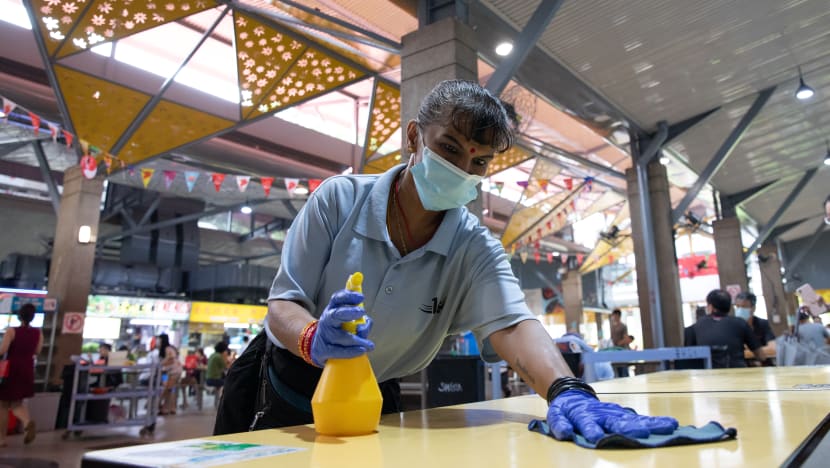 |
| A cleaner wiping a table at Sims Vista Market and Food Centre. (Photo: Ministry of Sustainability and the Environment) |
SINGAPORE: About 159,000 lower-wage workers will earn at least S$1,400 under a new local qualifying salary (LQS) requirement that kicks in on Thursday (Sep 1).
These are workers who are not in sectors covered by the progressive wage model (PWM).
Part-time local workers will also benefit from the new LQS requirement, as they will need to be paid at least S$9 in gross wages per hour.
LQS has been revised four times in the last five years and has risen from S$1,000 in 2016, to S$1,400. Employers will need to pay all their local workers at least S$1,400 in order to hire any foreign worker.
Prime Minister Lee Hsien Loong said in last year's National Day Rally that the PWM and other measures to raise the salaries of lower-wage workers will be rolled out to more people, extending to eight in 10 lower-wage workers over the next few years.
[So... like 80% Minimum Wage policy.]
Two other changes to wage schemes will also take effect on Sep 1.
First, the retail progressive wage model will be implemented, benefitting about 19,000 full-time retail workers, said the Ministry of Manpower (MOM) in a press release on Wednesday.
The ministry added the entry-level retail PWM wage will grow 18 per cent over a three-year period.
Second, the PWM for cleaning, security and landscape sectors - which originally applied only to outsourced workers - will be extended to cover those working in-house as well. This benefit about 19,000 full-time lower-wage workers, said MOM.
In total, 197,000 full-time lower-wage workers will benefit from the new progressive wage moves. This includes the new LQS requirement, and the introduction of the PWM for retail workers, as well as for in-house cleaners, security officers and landscape workers.
MOM said that employers are required to assess if their workers are performing a job role covered by a PWM by referring to the PWM job descriptions on MOM’s website. Employers must then update and submit their workers’ PWM job roles, if any, through MOM’s Occupational Employment Dataset portal.
From September 2022 to February 2023, tripartite partners will focus on educating employers on the various progressive wage requirements, with employers given time to adjust and comply, said MOM.
To support employers as they adjust to the progressive wage requirements, the Government is co-funding the wage increases given to lower-wage workers through the Progressive Wage Credit Scheme (PWCS), said MOM.
The PWCS will run for five years from 2022 to 2026.
Employers are urged to use this period of support from the Government to accelerate firm-level productivity improvements, so that the wage increases remain sustainable for employers in the long run, said MOM.
Source: CNA/fh(ac)
No comments:
Post a Comment